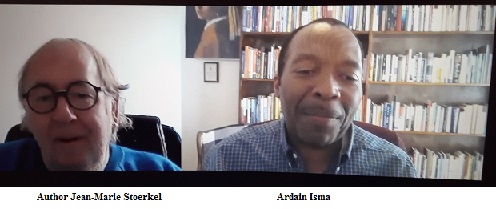CSMS Magazine
Three years ago, my wife and I traveled to Strasbourg, the largest city in the Alsace region of France. One morning, we visited the European parliament located in the European quarter. No one goes to Strasbourg without visiting this historical landmark. It was late morning in autumn—gray and cold—and the city began to emerge out of its slumber. So, from the European parliament, we decided to head for downtown, the historic district at the center of the attractions. When we arrived, I felt an odd urge to look for the Jacques Stéphen Alexis’ famous novel Compère Général Soleil published Chez Gallimard in 1956.
My wife, who loves to squander her money in buying haute couture clothing, was getting impatient. She wanted to go shopping, especially when we walked by Les Galleries de La Fayette, France’s fancy, mega chain store. Soon, someone told us to go to Maison Gallimard which was a block away. We rushed to Gallimard. There, we were told they only sold English books. I was shocked. I was in France, and I thought French books should be everywhere they sold books. So, we left, but few blocks down, we spotted a midsize bookstore. We went in, but instead of finding the JSA book, I discovered Crime de Guerre en Alsace (War Crimes in Alsace), a gut-wrenching investigative novel written by this impeccable Alsatian writer, Jean-Marie Stoerkel. He wrote the novel as a tribute to the Alsatian resistance to the Nazis during the Second World War.
The author gives you meticulous details of the war and the suffering of the Alsatians as they resisted courageously a powerful invader. From Mulhouse to Colmar to Strasbourg, the three main cities of Alsace, Jean-Marie Stoerkel leads his readers (and I’m one of them) to the heart of the resistance, using thrilling novelistic prose to hook them and keep them there.
Alsace is a Germanic region of France, where the locals speak Alsatian, a Germanic language not too different from the Alemannic language spoken in Southwestern Germany and in Switzerland. According to Jean-Marie, however, today fewer Alsatians speak that language, mostly in the villages.
At the start of the Second World War, Germany invaded France and immediately seized control of Alsace, thinking linguistic similarities and historical ties could sway Alsatians to their Machiavellian project. They were wrong. What happened next is beautifully described in Crime de Guerre en Alsace. When I returned home to Florida, I wolfed down the novel.
In March of 2018, shortly after I read the book, I did a small clip on You Tube in a series I used to call “Book Pic of the Week.” You can watch it here. Earlier this month, I contacted Jean-Marie, and he agreed to sit down for an interview.
Born to be a storyteller
Born in 1947 in Upper Rhine, Jean-Marie Stoerkel grew up in a working-class Alsatian family that suffered greatly under Nazi occupation. According to the author, his mother was arrested, tortured by the Gestapo, and sent to prison. This horrific circumstance, understandably, had placed him as a teenager in the camp of the anti-fascist left. One can sense his patriotism and his progressivism in his writings as well as in our conversation. Not surprisingly, in the 1970s, he was a member of the PSU (Unified Socialist Party.)
He did his military service in Madagascar. After returning from Africa, he met Father Pierre better known by his French name l’ abbé Pierre who founded the Emmaus community which had become a worldwide non-denominational Christian community that helps the poor.
He joined the community and made a first stay in 1970 in the Emmaus community of Harlem in New York, then with the Black Panthers in Chicago. From the US, he wrote a series of articles which were published in L’ Alsace, the region’s main newspaper. After his stay in the United States, he went back to Alsace. In 1972, he returned to Harlem and Chicago and then traveled for almost a year in South America, living and working in Emmaus communities. He recounted his journey in Latin America in his book published in 2008, Le Chaos de l’énergie, du Struthof à America, de l’Abbé Pierre au Che.
In September of 1973, he joined the daily L’Alsace à Mulhouse as a journalist, first in charge of the “young people” page, then, from 1977 until his retirement in July 2010, of the “news and justice” section. He notably investigated international trafficking of cigarettes, drugs and weapons, and the attack on Pope John Paul II on May 13, 1981 at Saint-Pierre Square in Rome, revealing that the second gunman was hidden in France.
The interview was conducted in French. It is lengthy. Consequently, I have made a summary in English that will be published early next week. To learn more about Jean-Marie Stoerkel, you can click here.
Watch the video below.
Note: Returning from Alsace in 2017, I also wrote an assay about the journey. You can read it here: In the pursuit of lost time: a postcard from Alsace, France
Subscribe to our You Tube channel.
Follow CSMS Magazine on Facebook: www.facebook.com/csmsmagazine
On Twitter: www.twitter.com/csmsmaga


